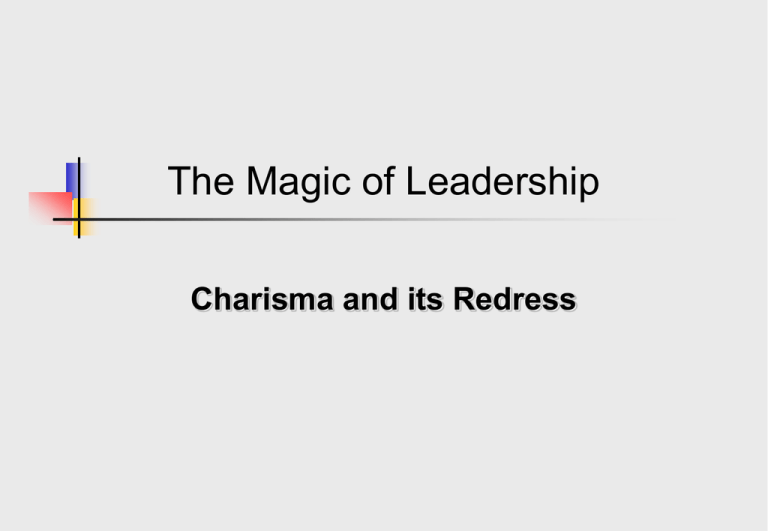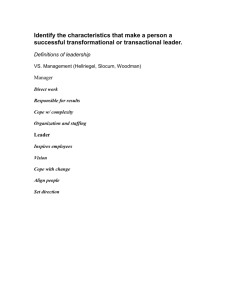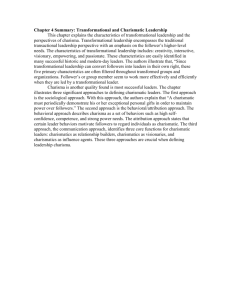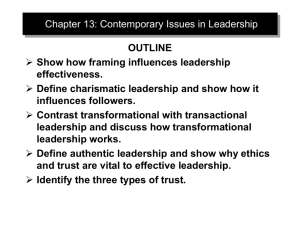Transformational Leadership
advertisement

The Magic of Leadership Charisma and its Redress Orientation • Charismatic Leadership and the uniqueness of the special leader • Examine maps of the New Leadership Pioneers • Transformational and transactional leadership • Dilemma of the ego driven transformational leader • Empowerment and the alignment between organizational and individual goals • Shift of focus to upper-level leadership 2 The Dilemma of Charisma Think about the following questions • What does being charismatic mean to you? • Have you ever met a person whom you would describe as charismatic? • What qualities made this person so special? • Would you be happy with her/him as a leader of your organization? Why? • Do you believe you possess some of the qualities of a charismatic person? • Are there ways you can acquire charismatic qualities? 3 Robert House and Path-Goal Theory • Claim that way leader behaves with respect to goals and followers influences the leadership impact • Leadership effectiveness is shaped by situational circumstances • In line with contemporary theories at the time, focus on leader’s consideration of followers’ needs and the task structure • Emphasis is placed on structuring the psychological maps of the followers, using motivational approach developed through valence theory • Situations of ambiguity draw more on directional leadership and repetitive work contexts require more consideration and encouragement • Transactional nature of early work led House to reformulate theory to be more aligned with new leadership ideas 4 Bernard Bass & Full Range Leadership Model • Core assumptions of self-interest and personal development • Transactional leadership transactional leaders respond to followers’ immediate selfinterests leader identifies with what followers want & helps them achieve level of performance that results in rewards that satisfy them • Transformational leadership leaders influence workforces to go beyond simple selfinterests leader has ability to inspire and motivate followers to achieve results greater than originally planned and for internal rewards 5 Bass’s Research on Transactional & Transformational Leadership Transformational leadership • Idealized influence - charisma • Inspirational motivation • Intellectual stimulation • Individualized consideration Transactional leadership • Contingent rewards & Constructive transactions • Management by exception • Laissez-faire leadership 6 Charisma & Transformational Leadership • Bass’s model examined using Multifactor leadership Questionnaire (MLQ) • Two similar and differentiable leadership styles? Idealisation of leader Inspirational content of leader’s words or vision Together a measure of charismatic leadership style • Provides an expanded picture of leadership that includes the exchange of rewards & leader’s attention to growth of followers • Places a strong emphasis on followers’ needs, values, and morals - motivated to transcend self-interests for good of team • Best leaders are both transformational and transactional 7 Jay Conger and Empowerment • Appreciation of dilemmas associated with empowerment • Theoretical rationale based on social learning theory • Individuals feel empowered through experience of Evidence that they are actually being successful Recognition of progress, by words of encouragement General emotional support Powerful role models • Creative jolts to expectations Jolt followers out of sense of negativity & behavioural impotence through act of leadership 8 Conger - Dark Side of Leadership • Conger warns of dangers associated with high-profile leadership practices • Looks at leaders first hailed as exemplary & later as misguided or morally suspect • Leader’s distort vision to meet egocentric ambitions • Leader develops sense of invulnerability & belief in ‘rightness’ of their vision • Failure of charismatic leader due to: Commitment to vision – shift to single-minded obsessiveness Authentic communication – with vision as extension of leader’s personality needs communication is les authentic Style of charismatic leader – exclusion and stereo-typing 9 James McGregor Burns on Empowerment • Burns is pioneer of transformational leadership • Transforming nature of a leadership act understood through unexpected and individualistic action of individual • Leadership roles exist in web of relationships which offer insights into how values impact on leadership The ethical dimension Social values Socially desired goals • Initiating acts trigger value-laden reactions by individuals acting out three roles • Dilemmas of empowerment who empowers who? To whose purpose? 10 Jim Collins on the Fifth Level Leader Beyond Charisma • Collins examined features of exceptional companies • From 1400 companies eleven chosen as showing sustained excellence. The strongest differentiating factor of these companies termed ‘level five leadership’ • Level 1 – Individual‘s talent, knowledge, & skills are key contribution • Level 2 – Leadership as collaborative team efforts • Level 3 – Competent manager, effectively organizes towards predetermined goals • Level 4 – Effective leader, promoting commitment to compelling vision & high performance standards • Level 5 – Executive builds great companies, exercising of personal humility combined with assertiveness (willfullness) 11 Summary • Fundamental map - charismatic leadership & relationship with new leadership thinking • Transformational leadership contrasted with economic exchange models of transactional leadership • Exposes mechanisms through which leaders manage change • Bass presents each leaders as having elements across a range of leadership styles. Transformational leaders incorporate some transformational behaviours • Transformation maps imply leadership development is possible at all organizational levels • Acceptance of charismatic leader ignores the dilemma of the self-seeking and destructive leader who is ‘taken on trust’. 12




